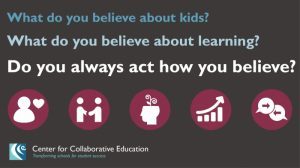10 Questions for Educators to Reflect on Their Expectations for Students
CompetencyWorks Blog
This post originally appeared at the Center for Collaborative Education on March 6, 2017.
What do you believe about kids? What do you believe about learning? Do you always act how you believe?
This list of questions is a tool for reflection and discussion. A fundamental belief at CCE is that all kids are capable of learning to high levels. All kids are capable of deeper learning. This shouldn’t be controversial, but in our work facilitating professional learning, we know from experience that we need to foster our ability to effectively engage people about words and behaviors that run counter to our commitment to high expectations for all.

Maine superintendent John Davis once asked his faculty, “Are we here for all kids, or just for the willing and able bodied?” There’s only one right answer. The list puts a sharp point on the question of every kid – the way Davis’ question does. We hope this list will galvanize you to join us in standing up the next time you hear something like, “Personalized learning is fine for gifted kids, but …” or, “Oh, our kids couldn’t do that,” or, “This is all we can expect from …” We hope this list helps you start reflective conversations about how we can fully act in line with our beliefs.
- Has a kid ever surprised you?
- Let’s say you do believe that some students may surprise you by improving. Can you look at your students today and know which will be surprising you tomorrow?
- A student is sitting in front of you. How do you know whether that student can learn to high levels or not?
- How do you know whether or not that student will be able to learn to high levels tomorrow?
- Do we ever continue to instruct and assess students using the same methods even when we see a mis-match to student learning styles?
- How do you help a low performing student reach higher levels?
- Are there times when you think you may have given up on a student and lowered expectations for them?
- Is it ever okay to lower your expectations for a student whose home life or background interferes with their success in school?
- Are there times when our actions and reactions reveal bias towards the “willing and able-bodied kids?”
- Are you teaching every kid, or some kids, or are you teaching the curriculum?
These are pointed and confrontational questions, for sure. However, it is necessary at times to confront assumptions that underlie our colleagues’ work, and undermine our students’ success. Confronting these underlying biases and assumptions can be uncomfortable. These questions bring the discomfort to the fore in order to help us realize that new ways of thinking are required and possible. This is only the beginning of the conversation. Yet, it is a strong beginning, because if we are aware that these conversations are necessary, we can begin to have them. We can begin to align our actions with our belief in high expectations for all students.
See also:
- Bringing Voices Together for Competency Education and Performance Assessment
- How Can I Tell if a School is Using Performance Assessments?
- Two Sides of the Same Coin: Competency-Based Education and Student Learning Objectives
Gary Chapin is a Senior Associate and Laurie Gagnon is the Director of the Quality Performance Assessment Program (QPA) at the Center for Collaborative Education (CCE) in Boston, MA.